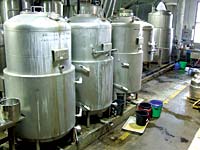To be sure, there are worse assignments than this one: drinking strong beer in the shade of a river birch on a summer afternoon, watching an old-but-spirited German shepherd fetch sticks from a creek. In fact, it feels a lot less like work than many peoples’ idea of what heaven might be like.

The reason I put myself through these privations was to learn something about high-gravity beer: How it’s made, what distinguishes it from grocery-store swill, and what challenges it poses for the brewers who make it.
Since high-gravity beer became legal in North Carolina two years ago, few commercial breweries in the Southeast have pursued the category with the flair and sense of adventure that Pisgah Brewing Company (www.pisgahbrewing.com) has. It seemed a visit was in order, so last week I traveled to Black Mountain to meet with Pisgah co-founder Jason Caughman, brewers Gaines Myer and John Silver and Caughman’s dog, Savannah, at the brewery along Old U.S. 70. On the afternoon I visited, the mercury was edging close to 90 degrees. The situation called for a beer and—glory be—Caughman suggested we take several samples out to a picnic table for an impromptu tasting.
High-gravity beer gets its physics-lab name from the simple fact that it’s made with a lot more sugar (barley malt, primarily) than most beer, which gives the unfermented beer, properly called “wort,” a high density, or “specific gravity.” Once yeast works its magic on all those carbs, the end product generally has a much higher alcohol content than typical beer.
Outside of homebrewers’ cellars, there simply were no high-gravity beers in North Carolina prior to 2005, when the General Assembly, under pressure from an alliance of beer aficionados called “Pop the Cap,” moved to repeal an antiquated statute that limited commercial beer’s alcohol content to 6 percent.
That same year, Caughman and business partner Dave Quinn started Pisgah Brewing Company. They’d met earlier in Folly Beach, S.C., and, as homebrewers, were united in their regard of beer-as-craft. Asheville, says Caughman, “seemed like the ideal demographic” for the small-batch product the two men envisioned.
Today Pisgah has a modest 10-barrel capacity, meaning that each batch of beer fills just 20 kegs. “There’s an argument to be made that the smaller the batch, the better the beer,” says Caughman. “Some people say that homebrew is the best beer around, and it’s hard to argue with that logic.”
But size alone doesn’t distinguish the brewery, which prides itself on its standing as a certified-organic operation—all the ingredients put into Pisgah beers are produced according to strict organic guidelines. Caughman reckons that fewer than 10 of the nation’s 1,600 breweries are certified organic.
Pisgah’s staple beers have always been its pale ale, porter and more recently, stout, but since day one, the brewery has also brewed limited amounts of high-gravity beers. At the time the state law was repealed, Caughman and Quinn happened to be sitting (figuratively speaking) on a batch of what they were calling “Imperial I.P.A.,” a tawny brew with an alcohol content in the 9 percent range, a full three percent more than the state’s Prohibition-era rules allowed.

Since that inaugural heavy, Pisgah has rolled out a steady stream of beers with lobotomizing amounts of alcohol in them. (To be fair, by volume they are no stronger than wine, but they do pose a challenge to the average pint-drinker.) They tend to have evocative names—Cosmos, Vortex #1 and #2, Hellbender—hinting of both physical danger and the possibility of being swept into something larger than one’s self.
“I would say we’ve done considerably more high-gravity than anyone else in town, maybe in the state,” says Caughman.
High-gravity beers are expensive to make. An ale with 10 percent alcohol requires roughly double the malt and hops required by a standard 5 percent beer. Stronger beers also require longer aging periods. Pisgah’s special holiday ale, Baptista, for example, rests for months at 50 degrees before it’s ready for the keg. Long aging mellows the hop bitterness and harsh alcohol notes sometimes associated with stronger beers, and marries the malt flavors.
While high-alcohol beers tend to fetch higher prices, in strict financial terms they also tend to be loss leaders, valued more for their ability to generate buzz and build customer loyalty than turn a profit.
They also help allay brewers’ boredom. Each high-gravity offering from Pisgah varies wildly in its ingredient list. Some are brewed with California ale yeast, which imparts a clean flavor to the final product. Others are brewed with a strain of yeast propagated from a Trappist abbey in Belgium at some time in the dim past, yielding a feral, fruity beer with an assertive clove taste. Any given recipe also features a complex malt blend, including crystal malt, Munich malt, black patent malt, chocolate malt and roasted barley.
Less-expected ingredients also make their way into the beers. Pisgah’s most recent high-gravity offering, Red Devil, was blended after fermentation with Oregon cherries and raspberries, as well as a touch of Equinox, the brewery’s signature Belgian ale. The result was an explosive fruitiness and a beautiful garnet color, not to mention an almost immediate sell-out at Barley’s in Asheville, Pisgah’s biggest draft outlet for its specialty beers.
Caughman says the brewery’s loyal customer base means a market is assured for even its most exotic products. “We don’t worry about ‘oh no—what are we going to do with all this beer?,’” he says. “The demand is always there. These are out for a week or two and they’re gone.”
The company’s other “big” beers are equally alluring. Cosmos—described on the label as a “Baltic porter”—is all cigars and leather armchair. Dried fruit, pipe tobacco, vintage port and a whiff of spicy alcohol are all at work in a mahogany-hued ale. Vortex #1, a “triple pale ale,” is awash in ripe fruit notes—strawberries, kiwi, pawpaw and so on—thanks to the high level of esters produced during fermentation. And Vortex #2, a Russian Imperial Stout, is so dark and sweet that it favors a chocolate martini. “It’s like motor oil,” Caughman said.
These are beers to be savored—preferably by a creek, and preferably with an empty hammock at the ready. They are also to be feared. They are enemies of journalistic impartiality. They wipe away skepticism and make even hardened reporters like myself hug strangers and say, “I love you, maaaaan.”


Hands down, best brewery in WNC.
Decent article on a great brewery. FWIW, it’s the Solstice that’s a Belgian. The Equinox is more of a harvest ale, and more British than Belgian.
Jake — Thanks for the correction. Duly noted.